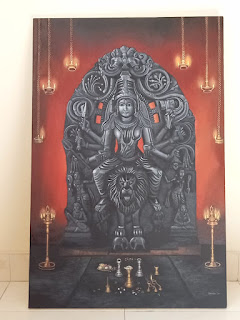The ink pen owner is a different animal. This species is almost extinct, now that we've moved on to laptops and I-Pads. But some of us have had an opportunity of studying this species at close quarters. For them, the ink pen is not just an instrument. It is an extended arm which needs to be given greater importance than even the upkeep of the body. Maintaining an ink pen is not easy. It requires an elaborate "sishrusha" from time to time. (Some of these Indian words defy an apt English equivalent. The closest would be "ritual" or "service" but these words don't convey the essence.) The pen has to taken apart, delicately washed in water, dried in the sun and finally filled with fresh Chelpark, royal-blue ink. It is an ethereal experience to simply watch this ceremony (more like an "abhisheka" at a temple) which will be culminated with a few rough strokes on a stray paper. For the owner, the pen is like a Ferrari: it has to be maintained with utmost care and should run nice and smooth. He clicks his tongue in satisfaction and writes the next sentence of his upcoming novel with an elegant hand.
Never ask this man for his pen because you need to sign your cheque at the bank and you've forgotten to bring a pen. He simply won't lend it to you.
Such is the intimate relationship of a man and his instrument. "Gandiva" was Arjuna's celebrated bow. The twang heard even from a distance sent shivers down the enemy's spine for they knew that Arjuna was around. The bow "Kodanda" was Rama's, "Pinaaka" was Shiva's and "Shaarnga" was Vishnu's. Not just weapons of mass destruction, even common place objects had a personality of their own. The conch "paanchajanya" only belonged to Krishna and the veena "Vipanchi" had to be Saraswati's. Some vaishnava temples in South India have a special shrine for Lord Vishnu's chakra (discus) personfied as a deity in its own right as "chakrat-aazhwaar".
As per popular tradition, the legendary naadaswara vidwan of yesteryears T.N. Rajaratnam Pillai did not play just another pipe. His was an ornately decorated one, studded with gold, with chains, trinkets and bells strung to it. These would jingle in their own sweet way as the maestro blew warbling notes of an enchanting melody!
Looking at the Cricket bats these days, the old timer is dejected. They all look uniform, dull and lifeless. All that we see is an oversized sticker of some sponsor stuck to the timber. He reminisces...Where are those days when Duncan Fearnley had to be wielded only by a Sunil Gavaskar, Gunn and Moore was Vengsarkar's, Sondico adorned Clive Lloyd's hands and SS was a Viv Richard's special ? These bats gave their owners an unmistakable halo. Without them, their owners would have surely remained as Lilliputs in their field.
Sadly, it is a use and throw generation nowadays that has lost this special relationship with its instruments.
"Can I have your ball-pen please ? I need to sign my cheque."
"Sure", says the man at the bank and hands me a pen. The cap is missing, the tip is blunt, the sides are smeared with some traces of dried ink and smudged with fingerprints, the top is completely disfigured and has teeth marks on it. Worse, it smells of saliva!
Never ask this man for his pen because you need to sign your cheque at the bank and you've forgotten to bring a pen. He simply won't lend it to you.
Such is the intimate relationship of a man and his instrument. "Gandiva" was Arjuna's celebrated bow. The twang heard even from a distance sent shivers down the enemy's spine for they knew that Arjuna was around. The bow "Kodanda" was Rama's, "Pinaaka" was Shiva's and "Shaarnga" was Vishnu's. Not just weapons of mass destruction, even common place objects had a personality of their own. The conch "paanchajanya" only belonged to Krishna and the veena "Vipanchi" had to be Saraswati's. Some vaishnava temples in South India have a special shrine for Lord Vishnu's chakra (discus) personfied as a deity in its own right as "chakrat-aazhwaar".
As per popular tradition, the legendary naadaswara vidwan of yesteryears T.N. Rajaratnam Pillai did not play just another pipe. His was an ornately decorated one, studded with gold, with chains, trinkets and bells strung to it. These would jingle in their own sweet way as the maestro blew warbling notes of an enchanting melody!
Looking at the Cricket bats these days, the old timer is dejected. They all look uniform, dull and lifeless. All that we see is an oversized sticker of some sponsor stuck to the timber. He reminisces...Where are those days when Duncan Fearnley had to be wielded only by a Sunil Gavaskar, Gunn and Moore was Vengsarkar's, Sondico adorned Clive Lloyd's hands and SS was a Viv Richard's special ? These bats gave their owners an unmistakable halo. Without them, their owners would have surely remained as Lilliputs in their field.
Sadly, it is a use and throw generation nowadays that has lost this special relationship with its instruments.
"Can I have your ball-pen please ? I need to sign my cheque."
"Sure", says the man at the bank and hands me a pen. The cap is missing, the tip is blunt, the sides are smeared with some traces of dried ink and smudged with fingerprints, the top is completely disfigured and has teeth marks on it. Worse, it smells of saliva!







